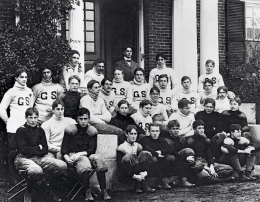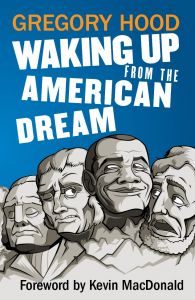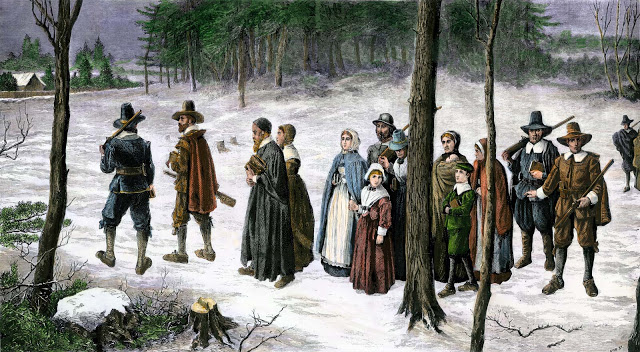Kevin MacDonald’s Individualism & The Western Liberal Tradition Part 6: From Puritan Individualism to Jewish Infiltration
Ricardo Duchesne
Franklin Delano Roosevelt (front, second from left) with his football team, 1899.
2,687 words
Chapter 6, “Puritanism: The Rise of Egalitarian Individualism and Moralistic Utopianism,” of Kevin MacDonald’s Individualism and the Western Liberal Tradition, claims that Puritanism and the intellectual movements descending from this religion were the “most important” forces shaping the culture of the United States “from the eighteenth century down to the mid-twentieth century.” Puritanism, and the WASP culture it engendered, would cease to be hegemonic over American culture as Jews came to infiltrate “critical sectors of American life” from the early 1900s onward.
For some time, Anglo-Saxon Darwinism managed to hold Jewish influence at bay, winning the battle for immigration restriction with the passing of the Immigration Act of 1924. But the Jews were growing behind the scenes. Two million arrived from Eastern Europe between 1890 and 1924. While they lost the fight against immigration restrictions, their influence would grow unimpeded in the media, the social sciences, the legal profession, and in finance. Darwinism, and the theories of race associated with this movement, would soon face defeat in academic circles, in no small measure because of the influence of Franz Boas. By 1965, Americans would come to agree with Jewish elites that their WASP nation was meant to be a “melting pot” of multiple races based on universal principles.
Jewish Infiltration of WASP Community Norms
Was there something in Puritanism and the Anglo-Saxon mindset that made them susceptible to this kind of infiltration? Contrary to common interpretations, MacDonald does not frame this debate solely in terms of WASP individualism versus Jewish in-group strategic control. He distinctly says that individualism is not incompatible with in-group strategies and collectivist norms. The Puritans had strong in-group markers. Their Anglo-Saxon descendants had a strong sense of ethnic identity; what it meant to be “distinctively American.” In fact, as we will see in our examination of later chapters, MacDonald believes that the “liberal cosmopolitanism” ruling the Western world today resembles “the Puritan tradition of combining individualistic tendencies with strong social controls.”
Western individualism has engendered its own forms of collectivism. The difference is that the collective identities the West promoted have tended to be based on moralistic/ideological principles rather than on kinship relations. Their ethnic attachments were exhibited within in-groups far larger (city-states and nation-states) than the typical clannish tribal groups we find outside the West. The argument is not that Western individualists were bereft of any communitarian ties. The argument revolves around different types and degrees of individualism in relationship with different types and degrees of “ideological” collectivism.
The type of moral communities whites created (relatively freed from kinship ties) left them susceptible to out-group infiltration. While Americans managed to create a very powerful nation-state with a strong in-group WASP ethnic identity, their liberal and egalitarian values left them susceptible to out-group infiltration. The Jews successfully radicalized the Anglo-Saxon “sense of fairness and egalitarianism” against an America based on a WASP identity.
“Puritanism as a Group Evolutionary Strategy”
MacDonald believes that the English Civil War, which established the influence of Puritan culture in both Britain and the United States, should be “seen as a turning point in the history of the West”:
It marked the beginning of the end of aristocratic individualism with its strong emphasis on hierarchy between social categories and the beginning of the rise of egalitarian individualism with its ideology of social leveling and parliamentary democracy — blended with capitalism and wealth accumulation.

You can buy Greg Hood’s Waking Up From the American Dream here.
In other words, the egalitarian individualism that originated among northwest European hunters and farmers took the upper hand away from the aristocratic individualism which prevailed in ancient and medieval times. MacDonald notes that Puritanism originated in East Anglia, a region with a strong tradition of freedom, fond of town meetings and arguments, with the “highest average intelligence in Britain,” and a larger proportion of literate inhabitants, scholars, and scientists.
I would add that East Anglia was a region with a high proportion of yeomen farmers — that is, a “middle class” of farmers, just below the gentry, in possession of their own land, without subordination to feudal lords, as well as free to serve on juries and in municipal police forces, from the 15th through 18th centuries. They were also individualistic in their heavy participation in the woolen cloth industry since the fourteenth century, which nurtured a tradition of self-determination and the consensual social contract.
However, the one cultural trait Puritans have stood out for historically, and Protestants generally, is liberty of conscience; every individual should be allowed to live by the faith that seems true to him; every individual should have “direct, unmediated access to God.” MacDonald observes that the “Puritan revolution was carried to its extreme in the United States,” where they were “freed of the hereditary aristocracy and religion of England, during the Jacksonian era.” Another feature of Puritanism was its tendency to “pursue utopian causes framed as moral issues,” in terms of “appeals to a ‘higher law’ and the belief that the principal purpose of government is moral.”
There was a tendency to paint political alternatives as starkly contrasting moral imperatives, with one side portrayed as evil incarnate — inspired by the devil.
This brings me to a trait MacDonald brings up right from the beginning, and it is that Puritans were also “strongly collectivist,” with clear ingroup-out group distinctions. This is why he writes of Puritanism as a “group evolutionary strategy.” It was not a “genetically closed strategy” (even though Puritans were ethnically homogeneous for a long time) since they were open to outsiders who converted to Puritanism. Puritans came to constitute, nevertheless, a very cohesive group with a
powerful emphasis on cultural conformity. . . and public regulation of personal behavior via social controls related to sex, lack of religious piety, public drunkenness, etc.
MacDonald calls these controls “anti-individualist” in the same vein as he designates Puritanism as an “individualistic group strategy.” This may seem confusing to those who think that individualism is inherently anti-collectivist, but it is not. The Puritan “individualist group strategy” was “remarkably adaptive in an evolutionary sense,” both in England and the United States. In the United States, Puritans “multiplied at a rapid rate, doubling every generation for two centuries.” They nurtured very strong families, with strict yet warm family practices and bonds. They emphasized literacy in both sons and daughters, supporting public libraries and schools. Within their communities, Puritans were indeed committed to egalitarian fairness “and the good of the group as a whole,” rather than allowing each individual to maximize his interests as a private agent. They had a strong moral commitment to the moral wellbeing of others. Farmers without any educational background, for example, “voluntarily contributed some of their harvest to support university faculty and students.”

At the same time in the United States, as Puritans prospered and “became more inclined to commercialism and materialism,” the religious controls waned; particularly as the population grew and the areas originally inhabited by Puritans grew into cities, as they were opened to waves of immigrants who were not committed to a Puritan way of life. These developments did not bring an end to the moral commitments of Puritans, but resulted in the rise of a “secular version of moral utopianism.”
Puritan-Descended Transcendentalist Intellectuals
Transcendentalists were a very influential intellectual elite (roughly from 1830 to 1860) in America with Puritan origins. They are called “transcendentalists” because they believed that humans could transcend their animal instincts by using their minds in the creative way it was meant to be used. They believed that humans could overcome their greedy impulses, lust for sex and power, and ethnocentric biases through socialization in the ideals of “brotherly love” and control over their bodily senses and appetites. MacDonald notes that this utopian optimism coincided with the incredible material progress American was witnessing in the nineteenth century in science and technology. This progress inculcated the belief — and not just among transcendentalists — that a “golden age of peace, harmony, righteous behavior, and material comfort” was attainable.
One could get into a long discussion here about how the ability of whites to form groups freed from biologically-based kin-groups is what allowed them — not just transcendentalists, but Western thinkers from ancient times onward — to employ their minds in far more creative ways than all the other cultures combined. This creativity, witnessed in multiple fields — the arts, architecture, music — can hardly be identified as inherently naive just because it presupposes the freeing of the mind from purely Darwinian pressures. It can, and has been, the basis for Western “realism” and the formation of powerful ethnic states, and indeed the creativity behind Darwinism. This transcendence, however, can be very dangerous, as we have seen aplenty in the many utopian worlds whites have concocted out of their imagination. The American transcendentalists, as was observed of Ralph Waldo Emerson, one of the main intellectuals of this group, tended to be men with a “cheery, child-like soul, impervious to the evidence of evil” — easy prey to manipulators of the mind.
Although the ideas of transcendentalists would lose their preeminence after the bloody Civil War, and American intellectuals would be influenced by ideas of progress based on realistic assessments of human nature, their illusions about a peaceful “brotherhood” across the world would continue to influence American liberalism thereafter.
Anglo-Saxon Individualism and Ethnic Identification
One could argue, roughly speaking, that the Anglo-Saxon liberalism that came to dominate America from the late 1800s through to the 1960s was a compromise between the universalism of transcendentalism and the materialism of Darwinism. On the moderate side (so to speak) were the Anglo-Saxons who were proud of their ethnic identity and view their individualism as a unique attribute of their ethnic heritage, while believing, at the same time, that immigrants from other European ethnic groups could be assimilated into the dominant WASP culture. They were influenced by the Social Darwinists, but they also believed that non-Anglos could be socialized to act like “good Anglo-Saxons.” They believed that their individualism “sprang from their ethnic heritage” and that if this heritage was to be preserved immigrants had to be raised as good Anglos.
Some Anglos were more radical in their individualism, advocating individual freedom from all remaining Puritan social controls; identified by MacDonald as “early precursors of 1960s hippiedom, celebrating self-discovery, emotion over logic, intuition, rebellion, free love, Black jazz,” but others were on the right of the Anglo-Saxon spectrum, influenced by Darwinian theories of race. While we can say that the Anglo-Saxons intellectuals who advocated assimilation were voicing the majority view among Americans, MacDonald identifies the long period from 1880 to 1965 as a period of “ethnic defense” in acknowledgment of the considerable influence that Social Darwinian ideas (developed by Arthur de Gobineau, Houston Stewart Chamberlain, Gustave Le Bon, Herbert Spencer, Madison Grant, and Lothrop Stoddard) played in ensuring the Immigration Act of 1924 and keeping the borders closed until 1965. For these Darwinians, racial differences were real, and the races were “in competition with each other for supremacy.”
For MacDonald, then, WASP culture had nurtured within itself a strong Darwinian movement capable of instilling a solid sense of ethnic identity among white Americans. But this current would not last. Right from the beginning, as this school held sway, a cadre of Jewish immigrants, fresh off the boats, set out to argue that the American ideals of individualism and universalism were inconsistent with any notion of America as an Anglo-Saxon ethnic state.
Between Jewish Universalism and Jewish Nationalism
Some Jews argued that all races, including Jews, should dissolve themselves within an American melting pot of races. But the more influential Jews, themselves influenced by Darwinian race theories, believed that Jews, in the words of Felix Adler (1851-1933), should only “universalize themselves out of existence when the task [of ethnic dissolution of non-Jews] was complete.” The Jews had their own unique universalist ethics, with a commitment to bring an end to the ethnic and racial identities of Americans (and the rest of the world). Jews should preserve themselves as the harbingers of a new world order. At the same time, Jews should build their own nationalism in order to protect themselves in a world full of antisemitism. Some Jewish intellectuals (Israel Zangwill, for example) would argue that “Jews were a morally superior race” with a morally superior religion — Judaism — with a “moral vision” to become the shining light for a future America bereft of its historic Anglo-Saxon identity.
I was very surprised to learn from MacDonald (when first I read some four years ago his article, “Jewish Involvement in Shaping American Immigration Policy, 1881-1965“) that Jews were the first to articulate the idea of multiculturalism. I thought that the theory of multiculturalism was quintessentially Canadian. While I still think that Canadians, such as Will Kymlicka and Charles Taylor, would go on to develop a full explanation of how multiculturalism, not assimilation, was consistent with Western liberalism, it continues to surprise me (reading this chapter) that back in the early 1900s Jews were already making the case that America was meant to be a “polycentric” nation characterized by cultural pluralism. To compel immigrants to assimilate to a dominant Anglo-Saxon culture, Jewish intellectuals were arguing long ago, would constitute a violation of their “human dignity.” Assimilation entailed the denigration of the culture of immigrants. The nation of America must be de-linked from its Anglo-Saxon ethnic core. Anglo-Saxon culture should be seen as just one culture among many others.

Worse than this, actually; for Jews, the Anglo-Saxon majority culture in America was never meant to be a particular culture in its own right, but a culture inherently open to multiple cultures with their own particular identities. This view was only a few steps away from the Canadian idea that immigrant minorities deserve special group rights to protect themselves from the majority European culture with its inherent tendency to be racist and discriminatory.
MacDonald emphasizes how Franz Boas and his followers would assume control over the American Anthropology Association, as well as every major department of anthropology, by 1926, displacing the Darwinians. Jewish intellectuals effectively exploited the moral universalism of American liberals, a task becoming all the more easy after the Second World War, which discredited ethnic nationalism as inherently belligerent and genocidal. This intellectual displacement of the Darwinians (and the American intellectuals who emphasized their Anglo-Saxon cultural heritage) came together with the “unseen power” of Jewish international finance, increasing control of the media and outright ownership of major newspapers. Henry Ford famously wrote about this influence, observing in the 1920s that Americans had been made to feel that public discussion of the Jewish Question was improper.
It does not seem quite accurate to say that collectivist Jews exploited the inherent inability of American individualism to generate any form of ethnic identity. It seems more accurate to say that they hijacked Anglo-Saxon moral communities. The same Jewish intellectuals who would “expose the power structures of white America” would come to create a rigid ideological community with norms prohibiting debate on race differences, biological differences between the sexes, criticism of mass immigration, and white identity. A strange social order would appear, characterized by the decline of the family, paternal authority, and genuine individualism. The Anglo-Saxons were genuine individuals in their appreciation of the capacity of the rational ego to decide what is “the good life” in communication with others. But this rational self, capable of choosing its own religious beliefs, was substituted by what Christopher Lasch would call in the 1970s a narcissistic individualism entrapped to a world of consumerism; helpless, dependent, and passive, but assured by the politically correct community that he is living a meaningful life as long as he accepts diversity without rational criticism, views whites as inherently racist, praises non-whites for their authentic culture, and longs for a multicultural world across the West.
If you want to support our work, please send us a donation by going to our Entropy page and selecting “send paid chat.” Entropy allows you to donate any amount from $3 and up. All comments will be read and discussed in the next episode of Counter-Currents Radio, which airs every Friday.
This article was originally published at the Council for European Canadians.
Kevin%20MacDonaldand%238217%3Bs%20Individualism%20and%23038%3B%20The%20Western%20Liberal%20Tradition%20Part%206%3A%20From%20Puritan%20Individualism%20to%20Jewish%20Infiltration
Share
-
- Gab
- Kevin MacDonald#8217;s Individualism The Western Liberal Tradition Part 6: From Puritan Individualism to Jewish Infiltration &body=%0D%0A%0D%0A%0D%0A%0D%0A%0D%0A%0D%0Ahttps://counter-currents.com/2020/05/kevin-macdonalds-individualism-the-western-liberal-tradition-part-6-from-puritan-individualism-to-jewish-infiltration/%0D%0A%0D%0A%0D%0A%0D%0A">
Enjoyed this article?
Be the first to leave a tip in the jar!
Related
-
Elizabeth Dilling on the Evil of the Talmud
-
The Worst Week Yet: April 21-27, 2024
-
The Significant and Decisive Influence that Leads to Wars
-
Whither Thou Goest, Diaspora?
-
Nowej Prawicy przeciw Starej Prawicy, Rozdział 2: Hegemonia
-
Katharine the Great: The State of British Education
-
Nowej Prawicy przeciw Starej Prawicy: Przedmowa
-
Stalin’s Affirmative Action Policy
2 comments
According to Hiliare Belloc in The Great Heresies, Protestantism contains a judaising tendency, Puritanism all the more so. In that sense they are less resilient to the spirit of modernity than the Catholic faith.
Perhaps the natural ethno-religiousity of the Anglo-Saxon is indeed Catholicism, or its nostalgic continuation by other means, high Anglicanism? In the Marian days of yore our green and pleasant land was Our Lady’s Dower, where jolly abbots bumbled and fairies tumbled and each man, Lord or lowly serf knew and had his place.
But that was not a merry epoch for England’s Jews: blood-libelled, massacred and finally expelled, not to be readmitted until the Cromwellian interregnum.
America is but the latest battleground for the twenty centuries old quarrel between Church and Synagogue. As for England, it seems she will succumb, as Belloc’s great friend Chesterton wryly predicted, in The Flying Inn, to the encroachment of Islam.
It should be noted and remembered that the Puritans in England, 1600s, advocated changing the language of England to Hebrew, advocated changing the Holy Day from Sunday to Saturday (as in judaism) and started using the Old Testament names such as Isaac, Isaiah, Ebenezer, Abraham, Solomon etc.
This should tell Whites a lot about the animating spirit of Puritans. Just like the ancestry of many British nobility/aristocracy and even royalty throughout the 1700s, increasing in the 1800s and culminating in the early 1900s should give a clue as to why so many of the British Parliament and Monarchy did utterly destructive things to England and Empire throughout that time. Many indebted aristocracy/monarchy married jewish daughters of jew money men to pay the debt. Or to get money for maintaining lifestyle of a higher up. Meaning their progeny and descendants, who inherited the titles, were part jew.
Comments are closed.
If you have Paywall access,
simply login first to see your comment auto-approved.
Note on comments privacy & moderation
Your email is never published nor shared.
Comments are moderated. If you don't see your comment, please be patient. If approved, it will appear here soon. Do not post your comment a second time.